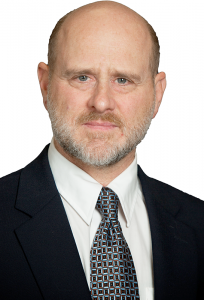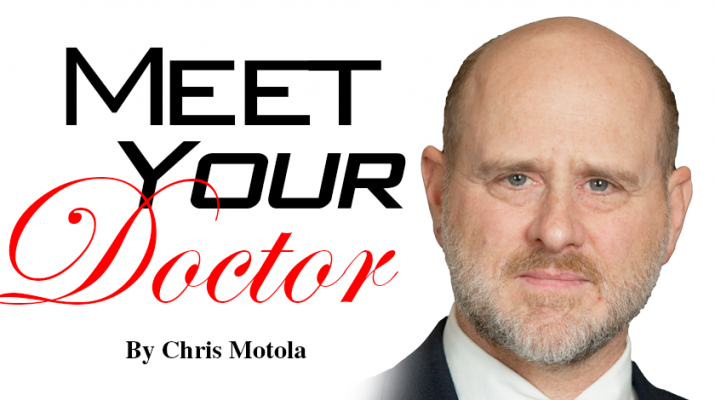Chief medical officer explains the goal of PACE CNY and how a team of doctors, nurses, therapists and other professionals keeps as many as 550 frail seniors at home
By Chris Motola
 Q: Give us an overview of your position.
Q: Give us an overview of your position.
A: I’m the medical lead at PACE CNY. My role is to oversee a lot of the administrative functions of PACE [Program of All-Inclusive Care for the Elderly]. I also oversee our clinics and diagnostic treatment center.
Q: What is the PACE program?
A: PACE is an organization that is charged with caring for frail elders. We essentially take people who are one step away from the nursing home and try to keep them at home. That’s our real goal. We do that by having a team working around them — physicians, nurses, nurse practitioners, and then home care, therapists and nutritionists who all do the work to make sure patients can be healthy at home. We also run a day center that helps people come in and meet their social and medical needs, as well as transportation to and from it. As a doctor who worked in private practice quite a lot in the old days, if I were to have a person with a lot of complicated issues, it would be very difficult to coordinate all of the things they needed in an organized fashion. PACE has the infrastructure set up to take care of that. So, if I have a patient that I notice is having trouble with their knee, I can have a plan to get them to a therapist before they leave the room. It’s kind of one-stop shopping for our elders. So, that’s helpful too. Once you sign up, we cover everything. There’s not extra responsibility for the patient to make any copays. We cover drugs, hospital visits, everything once they’re in the program.
Q: What are the advantages of keeping a patient in their home as a provider?
A: Let me first answer that with a question: have you ever been in a nursing home?
Q: Physically, yes, but of course not as a patient.
A: If you had the choice between living in your home or an institutional environment, it’s pretty easy. You’d rather be in your own home, with your own stuff around here. There are a lot of medical advantages, too. People are happier there, they have more access to their own family, familiar neighbors. We keep families together, spouses together. It’s not always easy. As people become more and more frail, there are more things we have to do to keep them there. So, that’s another nice thing about the day center: it can give caregivers a break.
Q: What are the typical needs of PACE patients?
A: It’s really a whole spectrum, but to qualify for PACE you have to have some kind of need. Usually they’re day-to-day things like cooking, bathing, dressing. These are things people often can’t do when they’re debilitated. Even medication. They may have trouble opening a pill bottle due to arthritis, or they may have trouble remembering to take their medications on time. So all those things are important things we can organize and keep on track.
Q: How large is the program now?
A: We have about 550 people that we manage.
Q: Is the demand going up with the baby boomers, or are they not quite in your demographic yet?
A: It’s getting there. You have to be 55 to be in the PACE program. We’ve been growing. We’ve doubled in size over the last 10 years, and we’ll continue to grow. There are other similar programs that are growing as well, even if they usually aren’t as comprehensive as PACE.
Q: Do you think institutional settings are becoming obsolete?
A: There are a couple ways to look at that. There are some efficiencies to nursing homes that you can’t achieve in the home. One nurse can handle a lot more people in one central location. So there are some things that are economies of scale. I think, in general, we try to get away from that model, but it doesn’t work for everyone. People in the later stages of Alzheimer’s disease, for example, tend to wander and need to be in a situation where they’re constantly monitored. We probably won’t get away from that until we cure Alzheimer’s. There are other people that need really intensive care and need someone around them. Unless you have nearly unlimited resources, which most people don’t, it’s hard to get that outside of an institutional setting.
Q: Is it more possible, now, to living a full lifespan without a long-term stay in a nursing home?
A: Yeah. Most of our folks are able to stay in their homes until end of life. At any one time, we only have 5 to 8 percent of our population in a nursing home. We feel we do a pretty good job of enabling our people to stay home longer. We’re pretty happy to have accomplished that.
Q: One of the challenges of aging is that it’s easy to become socially isolated. How does PACE address this?
A: It’s interesting, one of the challenges we have is that people don’t have to participate in our programs. We have, as part of the program, the day centers, which also double as social centers. Our folks spend one to five days a week in the centers. Generally, people are pretty happy doing that. We try to develop close working relationships with the folks as well.
Q: What communities is PACE CNY available in?
A: Our program is in Onondaga County only right now.
Lifelines
Name: Douglas Tucker, M.D.
Position: Chief medical officer of PACE CNY
Hometown: New Berlin, Wisc. Currently lives in Camillus
Education: University of Wisconsin Medical School, Madison, Wisc., MD degree, 1984; internal medicine residency program, SUNY Health Science Center, Syracuse (1984-1987); chief resident, medicine, SUNY Health Science Center, Syracuse (1987 to 1988)
Affiliations: N/A (works closely with Crouse, St. Joe’s, University Hospital)
Career: Member, board of directors, Loretto Management Corporation since 2015; attending physician, Van Duyn Home and Hospital (1988-2000); attending physician, Loretto Geriatric Center, 1997 to 2000.
Family: Four children
Hobbies: Cross-country skiing, biking, camping

